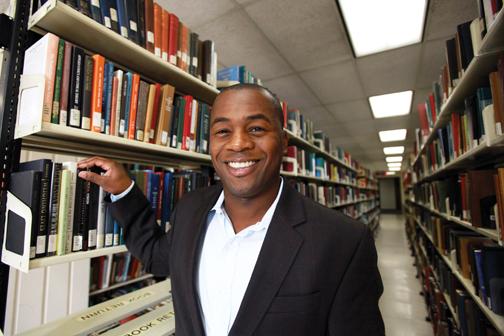San Diego State professor Frank Harris III recently co-authored a report called “A Role for policymakers in improving the Status of Black Male Students in U.S. Higher Education.”
In the report, Harris tackles the issue of low attendance of black males in college, one of the most underrepresented populations in U.S. higher education. The report urges policymakers, both federal and state, to fund better programs to substantially improve success rates for black males in higher education.
Advancement Via Individual Determination is one of the more recognized organizations when it comes to government-funded high school programs. Both rates were implemented to increase underprivileged student attendance on college campuses. However, according to the 2008 U.S. Census, black males only accommodate for about 4 percent of college students nationwide.
The report, which targets black males specifically, suggests they be provided with opportunities to increase this rate not only in college admissions but college success rates.
According to the U.S. Department of Education, black males graduate at a staggering rate of 33.1 percent.
Harris’ report decreases pressure on high school programs and encourages more college programs to raise college graduation rates.
“In today’s society, there are low expectations for black males” and “more encouragement in sports than education,” Harris said.
These are two components to his report and the issues behind low rates of black male participation in higher education.
“This is a societal problem,” Harris said. With 4 percent of black males attending college and 40 percent of black males imprisoned or in jail, according to the Department of Criminal Justice, Harris encourages policymakers to end this cycle. The report suggests that education while incarcerated help those who are imprisoned and unable to be further educated.
“San Diego State’s campus is fortunate to have such diversity. I encourage our student body to advocate for diversity and programs that bring not only diversity to this institution but allow the institution to flourish from it” Harris said.
Black male attendance in higher education is an issue, which throughout time has been deemed a valid and present issue that affects the black community tremendously. Harris, an African-American himself, is among the small percentage of black males who attended college. He came from a two-parent home, where he was encouraged to pursue higher education and that he did. Harris is a graduate of Loyola Marymount University and received his master’s degree in secondary education at the University of Southern California.
Harris, a 37 year-old father and husband, continues to advocate and bring a voice to one of the most underrepresented populations in this country. He suggests that interventions to improve black male student success will ensure improvement and change for those of future generations.







